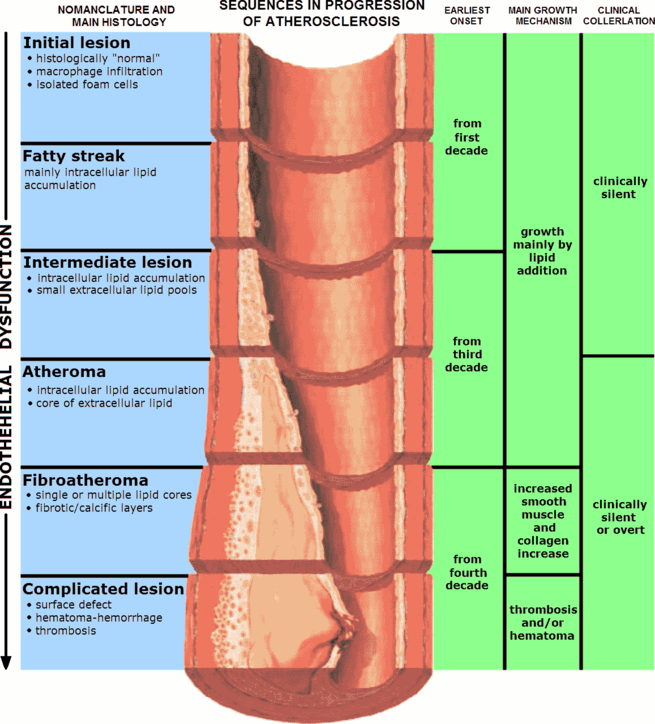
Main Difference
The main difference between Atherosclerosis and Arteriosclerosis is that the Atherosclerosis is a form of arteriosclerosis and Arteriosclerosis is a thickening, hardening and loss of elasticity of the walls of arteries.
-
Atherosclerosis
Atherosclerosis is a disease in which the inside of an artery narrows due to the build up of plaque. Initially, there are generally no symptoms. When severe, it can result in coronary artery disease, stroke, peripheral artery disease, or kidney problems, depending on which arteries are affected. Symptoms, if they occur, generally do not begin until middle age.The exact cause is not known. Risk factors include abnormal cholesterol levels, high blood pressure, diabetes, smoking, obesity, family history, and an unhealthy diet. Plaque is made up of fat, cholesterol, calcium, and other substances found in the blood. The narrowing of arteries limits the flow of oxygen-rich blood to parts of the body. Diagnosis is based upon a physical exam, electrocardiogram, and exercise stress test, among others.Prevention is generally by eating a healthy diet, exercising, not smoking, and maintaining a normal weight. Treatment of established disease may include medications to lower cholesterol such as statins, blood pressure medication, or medications that decrease clotting, such as aspirin. A number of procedures may also be carried out such as percutaneous coronary intervention, coronary artery bypass graft, or carotid endarterectomy.Atherosclerosis generally starts when a person is young and worsens with age. Almost all people are affected to some degree by the age of 65. Atherosclerosis is the number one cause of death and disability in the developed world. Atherosclerosis was first described in 1575. There is evidence, however, that the condition occurred in people more than 5,000 years ago.
-
Arteriosclerosis
Arteriosclerosis is the thickening, hardening and loss of elasticity of the walls of arteries. This process gradually restricts the blood flow to one’s organs and tissues and can lead to severe health risks brought on by atherosclerosis, which is a specific form of arteriosclerosis caused by the buildup of fatty plaques, cholesterol, and some other substances in and on the artery walls.It can be brought on by smoking, a bad diet or many genetic factors. Atherosclerosis, the primary cause of coronary artery disease (CAD) and stroke, is a disorder with multiple genetic and environmental contributions. Genetic-epidemiologic studies have identified a surprisingly long list of genetic and nongenetic risk factors for CAD. However, such studies indicate that family history is the most significant independent risk factor.
-
Atherosclerosis (noun)
The clogging or hardening of arteries or fatty deposits, usually cholesterol).
-
Arteriosclerosis (noun)
Hardening, arteries or blood vessels.
